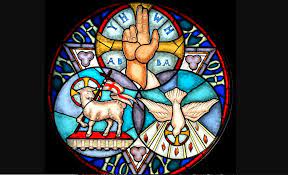HOMILY – TRINITY SUNDAY YEAR A
On Being “Theology of God” Students
(Exodus 34:4-6, 8-9; Daniel 3; 2 Cor 13:11-13; Jn 3:16-18)
*******************************************************
A Sunday School student was doing some art during the free time the teacher gave her class. When asked by the teacher what she was drawing, she replied that she was drawing a picture of God. The teacher gently told her that since we can’t see God, no one knows what God looks like. The student earnestly replied, without interrupting her work, “They will when I finish my picture.”
 The readings today for Trinity Sunday invite us to be students immersed in a fascinating course with great teachers on a Theology of God. We are invited to come to know God more intimately and to respond to our God through worship and love.
The readings today for Trinity Sunday invite us to be students immersed in a fascinating course with great teachers on a Theology of God. We are invited to come to know God more intimately and to respond to our God through worship and love.
In the first reading, our teacher is the great Old Testament prophet Moses himself. We see that he desires to grow in his knowledge of God, and learns the best way possible, through personal experience. During a theophany on Mt. Sinai, he encounters the living God as Lord, Kyrios, the one above all, who is merciful, gracious, forgiveness and love. He learns that God is also faithful and will journey with God’s people. That is the height of the Old Testament revelation of God. The two stones that Moses carries, the Law, can take us at least that far in knowing God.
We also see in that reading that the proper response to that revelation of God is the response of Moses, who worships this God as Lord, as one God, a monotheistic faith. This was a drastic change from the polytheistic religions of the day all the other surrounding nations practiced.
In the Gospel, Jesus himself is our teacher. Nicodemus, a fellow student, desires to grow in his knowledge of God. He learns through a night-time encounter with Jesus, that Jesus himself is the Son of God sent into the world to put flesh to that love of God and to offer the very life of God to those who believe in him.
We learn here the proper response to this revelation is belief in Jesus as Son of God, and that the greatest sin is unbelief, refusing to believe in the name of the only begotten Son of God.
In the second reading from 2 Corinthians, St. Paul becomes our teacher. He himself learned through a personal encounter with Jesus, like Nicodemus, who Jesus was. That was a faith tsunamie for Paul – a complete reversal of his whole belief system. He came to believe in and know God as Trinity, as family, as relationship, and not just as the Creator or Mighty one who dwells far away from us and who must be appeased by keeping the Law. It is Paul who succinctly expresses who God is in his salutation we use during the Eucharist: “The grace of the Lord Jesus Christ, the love of God and the communion of the Holy Spirit be with all of you.”
Our proper response to this full expression of God as Trinity, family, Jesus, God and Holy Spirit is a harmonious relationship in community along with worship, something Paul never stopped urging his faithful to practice in their daily lives.
I was visiting a friend when his fifteen-year old daughter came back from a soccer tournament. She burst into the house, dropped her bag on the floor, flopped on her dad’s lap, put her arm around his neck, and nestled her head against his for at least a minute, soaking up his love. He carried on with their conversation as if this was totally normal and expected. The other kids did not even notice, and his wife carried on preparing supper. This was normal in this household. I caught my breath and observed with awe this intimate father-daughter relationship. This might be as close to a picture of God as I would see on this earth, I thought to himself, and felt so grateful for what I was seeing – a living out of today’s gospel.
The Eucharist we celebrate today is an experience of God as Trinity. We begin with the Sign of the Cross, and St. Paul’s salutation. Jesus reveals to us through the readings the Father’s love for us. The power of the Holy Spirit then transforms humble gifts of bread and wine into the Body and Blood of Jesus.
Forgiven and healed, we who receive are in turn transformed into the Body of Jesus and commissioned to go out into the world to spread the Good News that God is family, intimate relationship and love. We are to respond by worshipping our Trinitarian God and loving one another.



